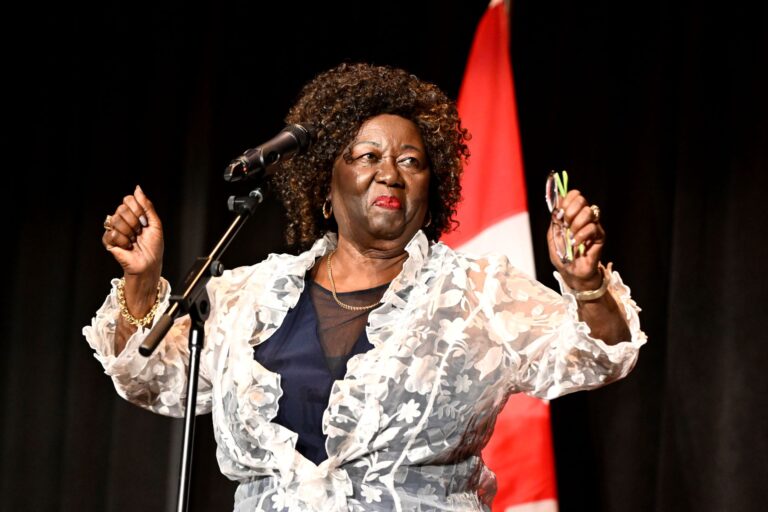In the Policy Options piece “Is addressing anti-Black racism in Canada still a policy priority?, Tari Ajadi and his co-authors have courageously initiated a conversation that many institutions would prefer to avoid.
Their examination of eroding anti-Black racism commitments provides essential accountability at a time when equity, diversity and inclusion (EDI) initiatives face mounting backlash across North America. However, their analysis perpetuates a fragmented approach that could ultimately undermine anti-racism efforts.
The Oppression Olympics trap
A focus on anti-Black racism as distinct from other forms of discrimination risks falling into what scholars term the “Oppression Olympics.” It’s a dynamic where marginalized groups compete to prove themselves more oppressed than others, comparing relative suffering based on race, gender, religion, sexuality, and other identity factors.
But as Elizabeth Martínez warned in her foundational work, “no competition of hierarchies should prevail.” When anti-Black racism is segmented from anti-Indigenous racism or other discrimination, it inadvertently leads to competing narratives that can divide marginalized communities. This fragmentation serves the interests of existing power structures by encouraging oppressed groups to fight against one another rather than addressing systemic inequities collectively.
The false separation of EDI and anti-racism
It’s true that EDI and anti-racism are not synonymous. But attacks on EDI initiatives are fundamentally attacks on anti-racism work. When political leaders employ “dog-whistle rhetoric about ending wokeism,” as the authors mention, they are targeting the entire infrastructure designed to address systemic discrimination.
Across Canada, EDI backlash is dismantling decades of progress. The University of Alberta, for example, is “rebranding” EDI. U.S. multinationals with a Canadian presence are slashing EDI programs. The Trump administration ordered the U.S. federal government in January to end EDI programs, and some governments in Canada are eliminating diversity roles. These represent a systematic rollback of human-rights protections. To treat this as separate from anti-Black racism efforts is to misunderstand the interconnected nature of oppression and resistance.
Beyond policy lenses: the need for cultural intelligence
Our public institutions have made significant strides in developing policy-analysis frameworks, from Gender-Based Analysis Plus (GBA+) to intersectionality-based policy analysis. But these approaches remain insufficient for addressing the complexity of our multicultural society. Current policy frameworks, though well-intentioned, often create what researchers call “tick-box exercises” that provide an appearance of progress without addressing structural inequities.
GBA+ requires policymakers to consider how policies affect different identity groups, while intersectionality-based policy analysis examines how forms of oppression interact. However, these frameworks often operate in silos, examining specific identity categories rather than understanding the complex cultural dynamics that shape lived experiences. They tend to focus on teaching information about different cultures without developing the deeper capabilities needed for effective cross-cultural policy work.
The many dangers of Pierre Poilievre’s war on ‘woke’
Canada needs to get on with tackling racism in concrete ways
Fear and discomfort shouldn’t block anti-racism efforts in schools
Black public servants locked in three-year legal battle with Ottawa with no end in sight
What policymakers truly need is a more comprehensive framework: cultural intelligence. Cultural intelligence, or CQ, is a globally recognized way of assessing and improving effectiveness in culturally diverse situations. Unlike traditional cultural competence programs, cultural intelligence develops four core capabilities: CQ drive (motivation to work across cultures), CQ knowledge (understanding cultural differences without stereotyping), CQ strategy (planning effectively across cultural contexts), and CQ action (adapting behaviour appropriately).
Cultural intelligence is a more holistic approach that recognizes culture as the broader context within which all identity categories operate. It acknowledges that effective policy must go beyond checking boxes for different demographic groups to understanding how cultural values, communication styles, and worldviews shape how policies are received and implemented.
The cultural-intelligence advantage
Cultural intelligence predicts success across domains relevant to policymaking: judgment and decision-making, negotiation, trust-building, innovation, and leadership. In policy contexts, culturally intelligent approaches create more effective, equitable, and culturally sensitive policies that resonate with diverse populations.
Rather than asking whether a policy affects Black Canadians differently than other groups, a cultural-intelligence lens would require policymakers to understand how cultural factors shape the entire policy environment. This includes recognizing how cultural values and norms significantly shape policymaking, and how policies that are not culturally sensitive may be met with resistance or fail to achieve intended goals.
Practical implementation
Implementing cultural intelligence in policy work requires several key shifts. First, policymakers must develop cultural competence and sensitivity (CQ drive and knowledge) that enable them to better understand the needs of diverse cultural groups and develop policies that are responsive to these needs. This goes beyond demographic analysis to understanding how cultural frameworks shape policy reception and effectiveness.
Second, policy development must incorporate cultural impact assessments (CQ strategy) and engage with diverse stakeholders to gather insights into cultural values and norms. This requires creating systematic processes for cultural intelligence among policymakers and public officials through targeted training and education that develops motivation, strategic thinking, and adaptive cross-cultural skills.
Third, policy evaluation must regularly assess cultural responsiveness, checking in with policymakers to adjust based on how policies perform across different cultural contexts (CQ action). This is a fundamental shift from static policy lenses to dynamic, culturally intelligent governance.
Moving forward together
The EDI backlash does indeed represent a critical moment for policymaking. But rather than retreating into separate initiatives for marginalized groups, a more nuanced approach needs to acknowledge the interconnected nature of oppression while fostering bridges across communities. Cultural intelligence provides this framework by focusing on the cultural contexts that shape all identity experiences.
This does not mean abandoning targeted anti-racism initiatives. It means embedding them in a broader cultural- intelligence framework that recognizes how culture shapes the entire policy landscape. When policymakers develop cultural intelligence, they become better equipped to design policies that address systemic racism while building coalitions across marginalized communities.
The authors’ call for moral fortitude in the face of backlash is well-taken. However, moral fortitude alone is insufficient without analytical tools to understand and respond to cultural complexity. By embracing cultural intelligence as a foundational policy competency, institutions can move beyond fragmented approaches to build more effective, inclusive, and transformative governance systems that serve all Canadians equitably.
The conversation initiated by the authors is an important step. The next step will be to broaden that conversation to include the cultural-intelligence framework, which can transform policy approaches in an increasingly diverse society.












